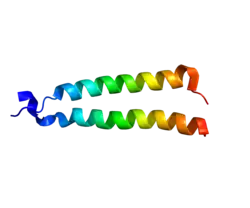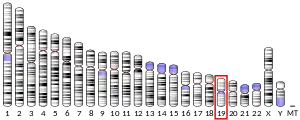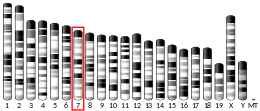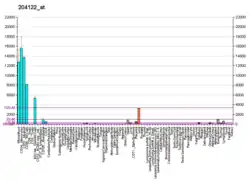TYRO protein tyrosine kinase-binding protein is an adapter protein that in humans is encoded by the TYROBP gene.[5][6]
Function
This gene encodes a transmembrane signaling polypeptide which contains an immunoreceptor tyrosine-based activation motif (ITAM) in its cytoplasmic domain. The encoded protein may associate with the killer cell immunoglobulin-like receptor (KIR) family of membrane glycoproteins and may act as an activating signal transduction element. This protein may bind zeta-chain associated protein kinase 70 kDa (ZAP-70) and spleen tyrosine kinase (SYK) and play a role in signal transduction, bone modeling, brain myelination, and inflammation. Mutations within this gene have been associated with polycystic lipomembranous osteodysplasia with sclerosing leukoencephalopathy (PLOSL), also known as Nasu-Hakola disease. Its putative receptor, triggering receptor expressed on myeloid cells 2 (TREM2), also causes PLOSL. Two alternative transcript variants encoding distinct isoforms have been identified for this gene. Other alternative splice variants have been described, but their full-length nature has not been determined.[7]
Interactions
Clinical significance
Pathological mutations of the TYROBP gene cause polycystic lipomembranous osteodysplasia with sclerosing leukoencephalopathy 1, a condition presenting as early-onset dementia.
References
- 1 2 3 GRCh38: Ensembl release 89: ENSG00000011600 - Ensembl, May 2017
- 1 2 3 GRCm38: Ensembl release 89: ENSMUSG00000030579 - Ensembl, May 2017
- ↑ "Human PubMed Reference:". National Center for Biotechnology Information, U.S. National Library of Medicine.
- ↑ "Mouse PubMed Reference:". National Center for Biotechnology Information, U.S. National Library of Medicine.
- ↑ Lanier LL, Corliss BC, Wu J, Leong C, Phillips JH (March 1998). "Immunoreceptor DAP12 bearing a tyrosine-based activation motif is involved in activating NK cells". Nature. 391 (6668): 703–7. Bibcode:1998Natur.391..703L. doi:10.1038/35642. PMID 9490415. S2CID 4324672.
- ↑ Paloneva J, Kestilä M, Wu J, Salminen A, Böhling T, Ruotsalainen V, Hakola P, Bakker AB, Phillips JH, Pekkarinen P, Lanier LL, Timonen T, Peltonen L (August 2000). "Loss-of-function mutations in TYROBP (DAP12) result in a presenile dementia with bone cysts". Nat Genet. 25 (3): 357–61. doi:10.1038/77153. PMID 10888890. S2CID 9243117.
- ↑ "Entrez Gene: TYROBP TYRO protein tyrosine kinase binding protein".
- ↑ Dietrich J, Cella M, Seiffert M, Bühring HJ, Colonna M (January 2000). "Cutting edge: signal-regulatory protein beta 1 is a DAP12-associated activating receptor expressed in myeloid cells". J. Immunol. 164 (1): 9–12. doi:10.4049/jimmunol.164.1.9. PMID 10604985.
- ↑ Tomasello E, Cant C, Bühring HJ, Vély F, André P, Seiffert M, Ullrich A, Vivier E (August 2000). "Association of signal-regulatory proteins beta with KARAP/DAP-12". Eur. J. Immunol. 30 (8): 2147–56. doi:10.1002/1521-4141(2000)30:8<2147::AID-IMMU2147>3.0.CO;2-1. PMID 10940905. S2CID 84258013.
External links
Further reading
- Colonna M (2003). "DAP12 signaling: from immune cells to bone modeling and brain myelination". J. Clin. Invest. 111 (3): 313–4. doi:10.1172/JCI17745. PMC 151875. PMID 12569153.
- Takaki R, Watson SR, Lanier LL (2007). "DAP12: an adapter protein with dual functionality". Immunol. Rev. 214: 118–29. doi:10.1111/j.1600-065X.2006.00466.x. PMID 17100880. S2CID 12937527.
- Bonaldo MF, Lennon G, Soares MB (1997). "Normalization and subtraction: two approaches to facilitate gene discovery". Genome Res. 6 (9): 791–806. doi:10.1101/gr.6.9.791. PMID 8889548.
- Pekkarinen P, Hovatta I, Hakola P, Järvi O, Kestilä M, Lenkkeri U, Adolfsson R, Holmgren G, Nylander PO, Tranebjaerg L, Terwilliger JD, Lönnqvist J, Peltonen L (1998). "Assignment of the locus for PLO-SL, a frontal-lobe dementia with bone cysts, to 19q13". Am. J. Hum. Genet. 62 (2): 362–72. doi:10.1086/301722. PMC 1376898. PMID 9463329.
- Lanier LL, Corliss B, Wu J, Phillips JH (1998). "Association of DAP12 with activating CD94/NKG2C NK cell receptors". Immunity. 8 (6): 693–701. doi:10.1016/S1074-7613(00)80574-9. PMID 9655483.
- Pekkarinen P, Kestilä M, Paloneva J, Terwillign J, Varilo T, Järvi O, Hakola P, Peltonen L (1999). "Fine-scale mapping of a novel dementia gene, PLOSL, by linkage disequilibrium". Genomics. 54 (2): 307–15. doi:10.1006/geno.1998.5591. PMID 9828133.
- Cantoni C, Bottino C, Vitale M, Pessino A, Augugliaro R, Malaspina A, Parolini S, Moretta L, Moretta A, Biassoni R (1999). "NKp44, A Triggering Receptor Involved in Tumor Cell Lysis by Activated Human Natural Killer Cells, Is a Novel Member of the Immunoglobulin Superfamily". J. Exp. Med. 189 (5): 787–96. doi:10.1084/jem.189.5.787. PMC 2192947. PMID 10049942.
- Bellón T, Heredia AB, Llano M, Minguela A, Rodriguez A, López-Botet M, Aparicio P (1999). "Triggering of effector functions on a CD8+ T cell clone upon the aggregation of an activatory CD94/kp39 heterodimer". J. Immunol. 162 (7): 3996–4002. doi:10.4049/jimmunol.162.7.3996. PMID 10201920.
- Bakker AB, Baker E, Sutherland GR, Phillips JH, Lanier LL (1999). "Myeloid DAP12-associating lectin (MDL)-1 is a cell surface receptor involved in the activation of myeloid cells". Proc. Natl. Acad. Sci. U.S.A. 96 (17): 9792–6. Bibcode:1999PNAS...96.9792B. doi:10.1073/pnas.96.17.9792. PMC 22289. PMID 10449773.
- Dietrich J, Cella M, Seiffert M, Bühring HJ, Colonna M (2000). "Cutting edge: signal-regulatory protein beta 1 is a DAP12-associated activating receptor expressed in myeloid cells". J. Immunol. 164 (1): 9–12. doi:10.4049/jimmunol.164.1.9. PMID 10604985.
- Bouchon A, Dietrich J, Colonna M (2000). "Cutting edge: inflammatory responses can be triggered by TREM-1, a novel receptor expressed on neutrophils and monocytes". J. Immunol. 164 (10): 4991–5. doi:10.4049/jimmunol.164.10.4991. PMID 10799849.
- Tomasello E, Cant C, Bühring HJ, Vély F, André P, Seiffert M, Ullrich A, Vivier E (2000). "Association of signal-regulatory proteins beta with KARAP/DAP-12". Eur. J. Immunol. 30 (8): 2147–56. doi:10.1002/1521-4141(2000)30:8<2147::AID-IMMU2147>3.0.CO;2-1. PMID 10940905. S2CID 84258013.
- Bottino C, Falco M, Sivori S, Moretta L, Moretta A, Biassoni R (2001). "Identification and molecular characterization of a natural mutant of the p50.2/KIR2DS2 activating NK receptor that fails to mediate NK cell triggering". Eur. J. Immunol. 30 (12): 3569–74. doi:10.1002/1521-4141(200012)30:12<3569::AID-IMMU3569>3.0.CO;2-E. PMID 11169398.
- Gingras MC, Lapillonne H, Margolin JF (2002). "TREM-1, MDL-1, and DAP12 expression is associated with a mature stage of myeloid development". Mol. Immunol. 38 (11): 817–24. doi:10.1016/S0161-5890(02)00004-4. PMID 11922939.
- Paloneva J, Manninen T, Christman G, Hovanes K, Mandelin J, Adolfsson R, Bianchin M, Bird T, Miranda R, Salmaggi A, Tranebjaerg L, Konttinen Y, Peltonen L (2002). "Mutations in Two Genes Encoding Different Subunits of a Receptor Signaling Complex Result in an Identical Disease Phenotype". Am. J. Hum. Genet. 71 (3): 656–62. doi:10.1086/342259. PMC 379202. PMID 12080485.
- Lucas M, Daniel L, Tomasello E, Guia S, Horschowski N, Aoki N, Figarella-Branger D, Gomez S, Vivier E (2002). "Massive inflammatory syndrome and lymphocytic immunodeficiency in KARAP/DAP12-transgenic mice". Eur. J. Immunol. 32 (9): 2653–63. doi:10.1002/1521-4141(200209)32:9<2653::AID-IMMU2653>3.0.CO;2-V. PMID 12207350.
- Kondo T, Takahashi K, Kohara N, Takahashi Y, Hayashi S, Takahashi H, Matsuo H, Yamazaki M, Inoue K, Miyamoto K, Yamamura T (2002). "Heterogeneity of presenile dementia with bone cysts (Nasu-Hakola disease): three genetic forms". Neurology. 59 (7): 1105–7. doi:10.1212/wnl.59.7.1105. PMID 12370476. S2CID 36364470.
- Gilfillan S, Ho EL, Cella M, Yokoyama WM, Colonna M (2002). "NKG2D recruits two distinct adapters to trigger NK cell activation and costimulation". Nat. Immunol. 3 (12): 1150–5. doi:10.1038/ni857. PMID 12426564. S2CID 5859797.





